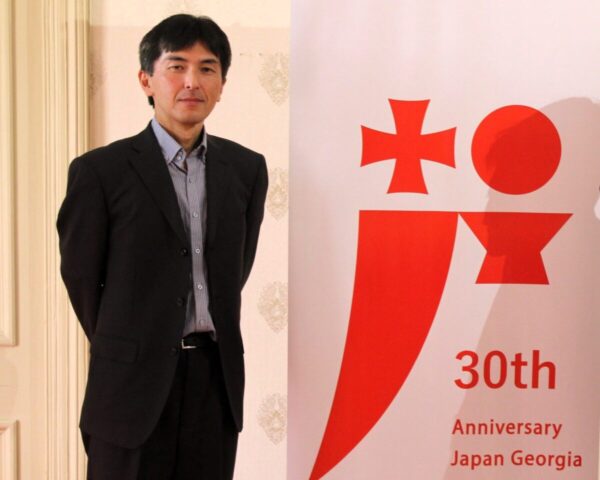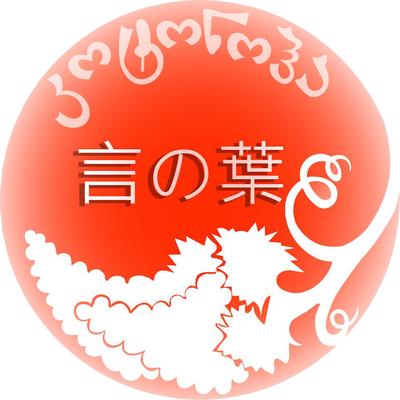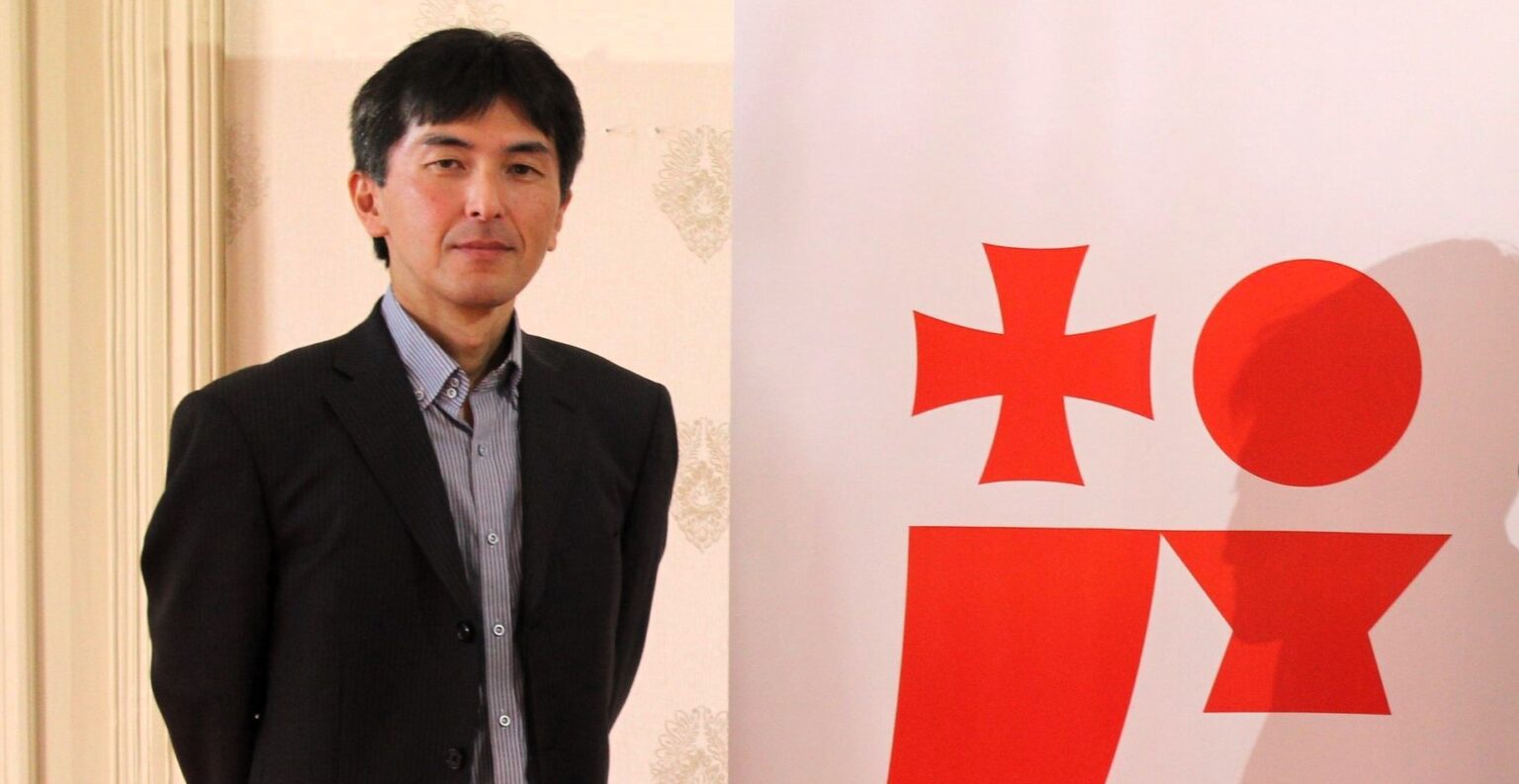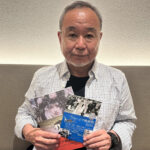【Profile】
Yasuhiro Kojima lives in Tbilisi. He graduated from Tokyo University with a degree in Linguistics. He worked as a special researcher of the Society for the Promotion of Science of Japan, as well as a special researcher of the Institute of Asian and African Languages and Cultures of Tokyo University of Foreign Studies and a specialist researcher in the Embassy of Japan in Georgia. Currently he works on translation and subtitles for Georgian film festival.
―― What was the first thing that sparked your interest in Georgia?
Yasuhiro Kojima san:
I became interested in Georgia and the Georgian language in my third year of university.
In the first and second year at the University of Tokyo, we took basic courses, and in the third year we had to choose a specialization. Based on my prior interest, I chose the Faculty of Linguistics. While taking various courses, I got to know Caucasian languages and Georgian.
In addition, in the essays of the Czech linguist, Eichi Chino, the Georgian language was often spoken. These circumstances aroused my interest.
―― So you have been interested in this field since your third year of university.
Yasuhiro Kojima san:
In my fourth year of university, I was going to write a diploma thesis and decided to study Georgian. So I studied the language with Howard Aronson’s books every day during the spring break of the fourth year.
The more knowledge I gained, the more I wanted to master Georgian better and study this language in depth. That’s why I started to search whether Georgians lived around Tokyo.
Eventually I found out that one Georgian family lived in Hiratsuka, Kanagawa prefecture.
It was father, mother, eldest daughter, middle daughter and son. The father was a physics engineer and worked in a Japanese company’s laboratory. In 1997, I met this family and started meeting and interacting with them once a week. I still feel connected to this family.
―― So you learned the Georgian language and had contact with a Georgian family, and then continued your studies at the master program at the university.
Yasuhiro Kojima san:
My bachelor’s thesis was about the grammar of the Georgian language. I finished my studies at the university in March 1998. In April, I entered the master’s program because I wanted to continue researching the Georgian language. I started thinking and had a strong desire to go to Georgia.
I searched for information from various sources and learned that a one-month summer school was open at Tbilisi State University. I sent the application and joined the program. The program was interestingly structured -the Georgian language, the history and culture of Georgia were also taught and excursions were organized on Sundays in addition.
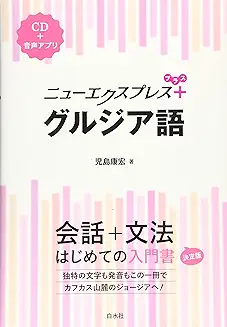
Author: Yasuhiro Kojima
Publisher: Hakusuisha
―― I think that you had studied other languages before having learned the Georgian language. What was the special attraction that the Georgian language had for you, compared to other languages?
Yasuhiro Kojima san:
While studying linguistics at university, I came across the concept of ergative languages and was amazed that there was such a completely different way of looking at things. I had a desire to study more deeply and experience what sensations the ergative language evoked.
At first I was interested in Russia and Eastern European countries and I was studying Russian. Followingly, I became interested in the Georgian language.
―― What was the reaction of your family when you decided to go to Georgia?
Yasuhiro Kojima san:
I think my parents were worried even though it wasn’t just a trip, but a university summer study program. Nowadays, Georgia is already well-known, but at the time when it was called “Gurzia”, not much information was available. I thought that living there would be quite difficult, that it would be a “struggle for survival”. I even shaved my head because I heard that taking a shower would also be difficult
I had to go to Georgia in the summer and I didn’t even know if it would be possible to take a shower.
They said that it was very hot there. At that time, the university accommodation had a shower, but no hot water. Gas and electricity were often cut off.
―― I think that at that time the conditions in Georgia were quite different from today’s. The number of foreigners would be much less. When you spoke in Georgian, what was the reaction of the locals?
Yasuhiro Kojima san:
It was very interesting. At that time, a foreigner was rare. There were few Asians in particular. When I walked down the street, I often felt the stares of the locals. When I entered the store and asked for something in Georgian, they were surprised and asked me: “Since when have you been in Georgia?”, “How do you know Georgian?”, “Where are you from?” etc. They would ask tons of questions.
Nowadays, Georgian people are used to foreigners who speak Georgian but at that time they were surprised at my “Gamarjoba” and considered it interesting.
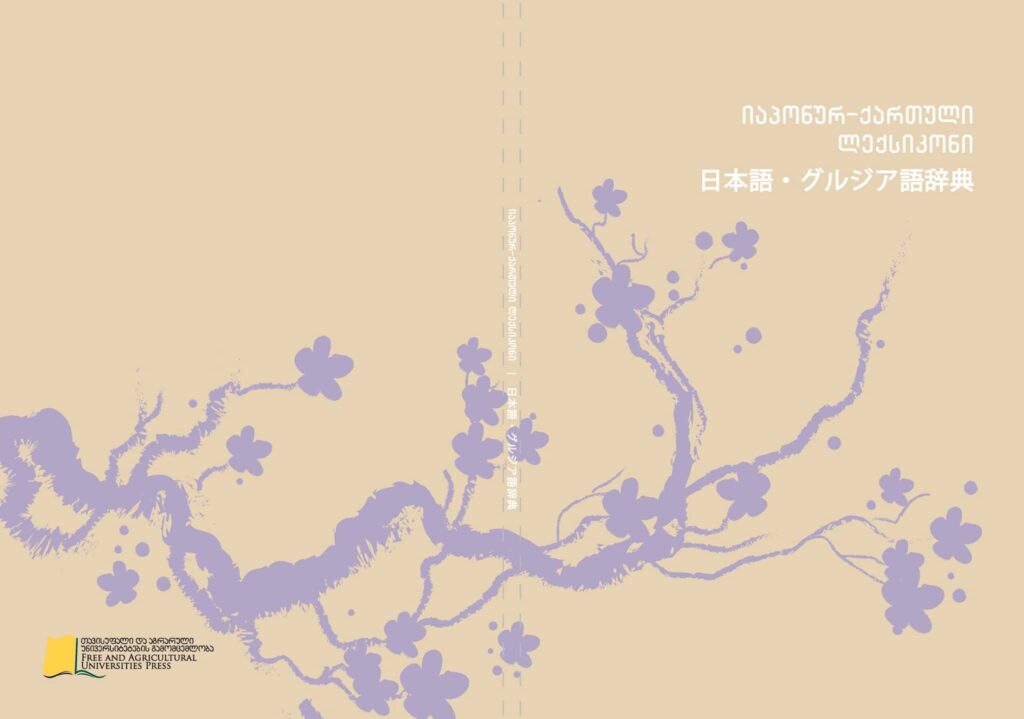
Authors: Yasuhiro Kojima and Medea Gotsiridze-Kojima
Publisher: FREE AND AGRICULTURAL UNIVERSITY PRESS
―― After a one-month summer school, you returned to Japan and for about 1.5 years you continued to study the Georgian language for your master’s degree, right?
Yasuhiro Kojima san:
Yes, I graduated from the 2-year Master’s program in March 2000. Then I went to a summer program in Georgia for another month, but I decided that I needed long-term studies to master Georgian perfectly.
At that time, the Ministry of Education and Science had an “Exchange Student Program for Asian Countries”, and I applied. I became a student of the program and again went to Tbilisi State University for 2 years from September 2000.
―― And then, you were preparing for a long-term study visit to Georgia. Was it part of a master’s degree program?
Yasuhiro Kojima san
No, it was not part of the master’s program. At that time, it was very rare that a foreign student studied at Tbilisi State University. There were Turks and Lazes living on the coast of the Black Sea, near the Georgian border, who studied Georgian at the university, because the Laze and Georgian languages are close to each other.
I was a “guest student” and studied linguistics. In addition to the Georgian language, I also attended the lectures of the Svan, Megru, old Georgian and Chechen languages.
After 2 years of study, in September 2002 I married a Georgian woman and returned to Japan.
―― After studying abroad, what did you do when you returned to Japan?
Yasuhiro Kojima san
After returning to Japan, I continued my research on the Georgian language at the doctoral program of the University of Tokyo.
I also wanted to translate and publish Nodar Dumbadze’s “Me, Bebia, Iriko da Hilarion”, which I had read while studying abroad.
In 2004, I started Georgian language courses at the Asahi Culture Center.
At that time 6-7 people were interested. About 20 people came to the first trial course. I worked on the texts of the course, and my wife Medea taught the Georgian language.
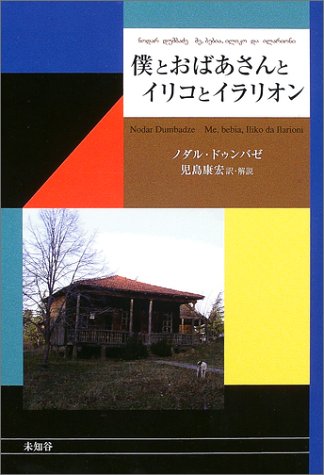
Author: Nodal Dumbaze
Translator: Yasuhiro Kojima
Publisher: Michitani
―― And your spouse Medea san taught Georgian.
Yasuhiro Kojima san:
My wife, Medea, graduated from the Faculty of Japanese Language at the Asia-Africa Institute of Tbilisi Free University and taught Japanese.
Since she already knew and spoke Japanese very well, she started teaching Georgian language at the Asahi Culture Center. When my wife was busy, I would teach Georgian language to the students.
―― As we know, after completing the doctoral course, you taught in different universities.
Yasuhiro Kojima san:
After completing my PhD course, I worked from 2010 to 2013 as a researcher at the Institute of Asian and African Languages and Cultures, commonly known as AA-Lab, at Tokyo University of Foreign Studies, teaching Georgian as an elective. I also taught linguistics classes at Chuo Gakuin University and Seizen Women’s University.
―― After that, you also worked as a specialist researcher at the Japanese Embassy in Georgia.
Yasuhiro Kojima san:
After completing the two-year exchange program, I returned to Japan, but still I continued to come to Georgia once or twice a year.After completing the exchange programs, I lived in Tokyo for 10 years, but I realized that I wanted to stay in Georgia even longer.
During this period, I learned about the position of a specialist researcher at the Embassy of Japan in Georgia, passed the exam and worked at the embassy for about five years since 2013.
―― And after working at the embassy, you started working in the translation field as you are now.
Yasuhiro Kojima san:
Yes, I had the opportunity to return to Japan in 2018 after finishing my work at the embassy. However, I felt more comfortable in Georgia, so I decided to stay.
Preparations for the first film festival of Georgia started, which was held in October 2018. When I was working as a specialist-researcher in the embassy, Takehide Harada san, who was still working in Iwanami Hall at the time, came to Georgia from time to time to prepare for the film festival. In August, before the Georgian Film Festival, we showed the trilogy of director Tengiz Abuladze “Confession” “Trash Tree” and “Supplication” So 2018 was a busy year for Iwanami Hall.
After finishing my work at the embassy, I was busy working on creating titles for these films. The first film festival of Georgia was successful. The second one was held in 2022 and Iwanami Hall was closed. 20 films were shown at the first, and 30 at the second. So I spent 2021 just creating subtitles.
Interest in Georgia also increased in 2022. In 2018, Tochinoshin won the championship, all seats were sold out, which was a great success, more than expected.
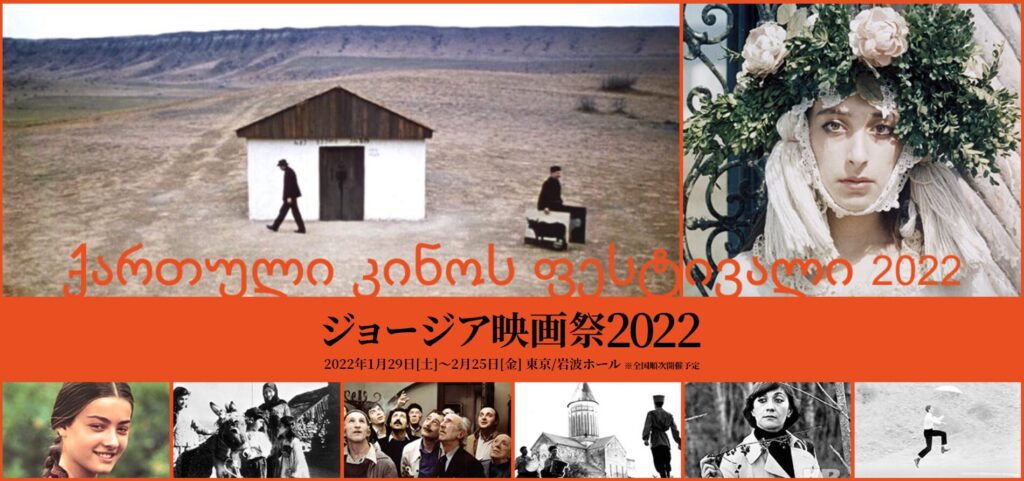
―― And now as we all know, you are preparing for the 3rd Georgian Film Festival.
Yasuhiro Kojima san:
It is scheduled for September 2024. Unfortunately, Iwanami Hall was closed, but the 3rd Georgian Film Festival is being planned in Shibuya.
―― How long does it take to create subtitles for one movie?
Yasuhiro Kojima san:
It depends on the movie. Most movies are about an hour and a half long. Some have as little as 600 lines of dialogue, while others have as much as 2,000 lines. If you really concentrate on translating, you can finish it in about 10 days, but it actually takes a little longer because there are so many other details.
―― How does the 3rd Georgian Film Festival planned for 2024 differ from previous festivals?
Yasuhiro Kojima san
Georgian cinematography includes many world-famous masterpieces created during the Soviet Union, such as “Firosman” and “Confession”, etc. Almost all films shot during the Soviet period are damaged and now in Georgia they are trying to digitally process and restore in 4K.
We are working with the Georgian side to show the restored film.
At the first Georgian film festival, not only films from the Soviet period were shown, but also relatively new films made in the last 10 years.
At the 2nd Film Festival of Georgia only old films were shown.
At the upcoming 3rd Georgian Film Festival, we are planning to show mainly films from the Soviet period. We will show some films that have been shown so far, which have been particularly well received, but we are also planning to feature films that have not been shown at the festival before, Georgia has recently revived it and is very interesting for Japanese people.
―― If you had to choose one movie, which one would you recommend?
Yasuhiro Kojima san:
This is a film by the director Eldar Shengelaia in Georgia, it is called “Sherekilebi” and it is also a masterpiece of the comedy genre. Please watch.
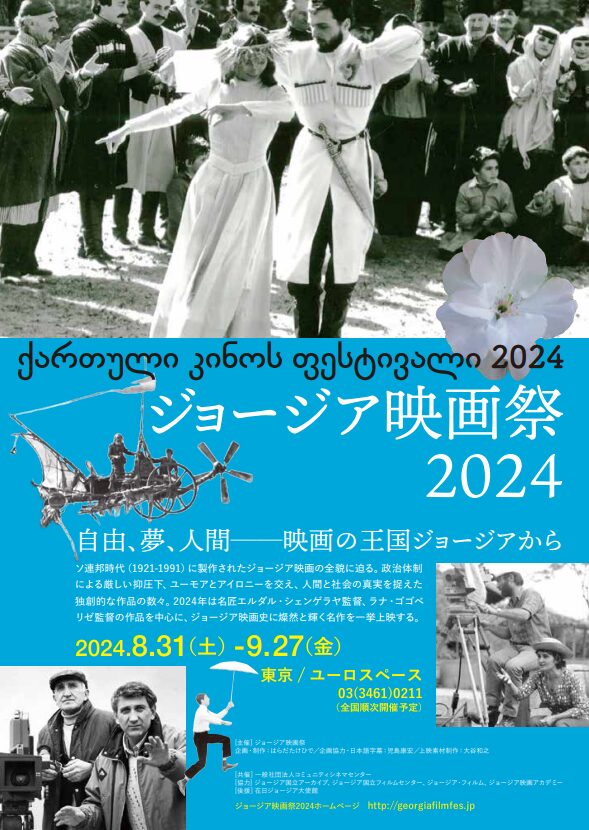
―― Finally, you have been working between Japan and Georgia for almost 30 years. We would like to ask you what is needed to bring the two countries closer together?
Yasuhiro Kojima san
When I first studied for two years with the exchange program, there were only four Japanese in Georgia.
On the other hand, a small number of Georgians lived in Japan as well. In addition to the Georgian family in Hiratsuka, with whom I interacted, there was a geologist Ms. Tea Godradze who was working in a laboratory in Tsukuba. It was around 1999.We got to know each other.
She introduced me to the Georgian Lezhava family, who lived in Tsukuba (Teimuraz Lezhava, Georgian ambassador to Japan). At that time, the number of Georgians living in Japan was small and there was less communication.
Initially, many people in Georgia knew about Japan. On the other hand, almost no one in Japan knew Georgia. But later, the victory of Tochinoshini, the popularity of Georgian wine, the Georgian film festival, concerts of Georgian musical ensembles, activities of Ambassador Lezhava and other events increased the awareness of Georgia in Japan. This is a welcome trend and I want to continue it.
What should we do about it? Economic and political ties are important, but what is most important is getting to know each other’s culture. On my part, I try to contribute by translating Georgian literature and showing Georgian cinema in Japan so that Japanese people can learn Georgian culture.
